By P Gosselin on 27. August 2023
Arson likely at play…images for shock journalists By Klimanachrichten Unusual weather situations are always the hour of attribution researchers these days. Canada is suffering from forest fires again this year. The reason is the persistent drought. According to a study, climate change has doubled the likelihood of forest fires in Canada: Extreme wildfire conditions in […]
Posted in Drought and Deserts, Fire |
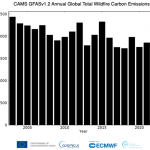
By P Gosselin on 10. June 2023
Wildfires, very much in the news recently, have tapered downward significantly over the recent decades, contradicting the doom and gloom spread by climate alarmists and media. German science editor Axel Bojanowski posted a chart at Twitter depicting the annual global total wildfire carbon emissions in metric tonnes since 2003: Wild fire emissions have trended down […]
Posted in Drought and Deserts, Fire |

By P Gosselin on 4. January 2023
Hybrid vehicles prone to catch fire…difficult to extinguish Symbol image. It’s safe to say most people are compelled to buy an hybrid or electric car because they wish to reduce their impact on the environment and climate. Unfortunately, many don’t seem to be aware of an electric car’s poor lifetime carbon budget and wind up […]
Posted in Alternative Energy, Fire |
By P Gosselin on 8. June 2022
In a previous post, Trend in Global Fires, data analyst Zoe Phin showed the global fire trend for the last 21 years. Since then, Zoe has taken it it a step further and found a source with more data going back to 1982: from a project funded by European Space Agency. RHere. Actual data is downloaded […]
Posted in Drought and Deserts, Fire |
By Kenneth Richard on 14. February 2022
In 2021, several hundred more scientific papers were published that cast doubt on the position that anthropogenic CO2 emissions function as the climate’s fundamental control knob…or that otherwise serve to question the efficacy of climate models or the related “consensus” positions commonly endorsed by policymakers and mainstream media sources. These scientific papers affirm the position […]
Posted in Alarmism, Antarctic, Arctic, Climate Sensitivity, Cloud Climate Influence, CO2 and GHG, Cooling/Temperature, Coral Reefs, Drought and Deserts, Fire, Flood, Glaciers, Hockey Team, Medieval Warm Period, Models, Natural Oceanic Oscillations, Natural Variability, Paleo-climatology, Sea Ice, Sea Levels, Temperature Bias/Urbanization, Warming/CO2 Benefiting Earth |
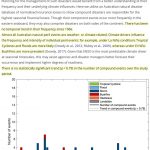
By Kenneth Richard on 13. September 2021
Three new studies affirm there has been no significant change in natural disasters, precipitation, or bushfire across Australia for the last several decades. Instances when perilous flooding, drought, bushfire, cyclones, storms, heatwaves…occur at the nearly same time are classified as “compound disaster” events. Across Australia, there has been no statistically significant trend in compound disaster […]
Posted in Drought and Deserts, Fire |
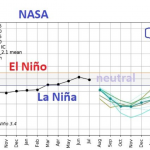
By P Gosselin on 8. August 2021
Here are 3 reasons why global surface temperatures will probably see continued cooling over the coming year. 1. La Nina back in the forecast NASA continues to project La Niña conditions into 2022 thus suggesting vigorous globally time-shifted cooling conditions: Source. NASA The NOAA-ENSO forecast also shows La Niña conditions taking hold again later this […]
Posted in Cooling/Temperature, Fire, Oceans, Pollution, Solar Sciences |
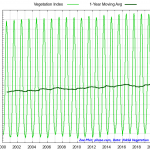
By P Gosselin on 24. February 2021
Looking at NASA’s Vegetation Index data, the news is good: the globe has greened 10% so far this century. That’s good news because we know this ultimately means greater crop production area and forest expansion. Ironically, what many “experts claim to be a huge problem (CO2) is in fact one of the major reasons behind […]
Posted in Drought and Deserts, Fire |
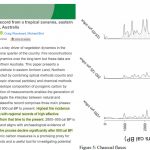
By Kenneth Richard on 18. February 2021
Two new studies suggest fires in Australia and the northwestern US raged with great frequency and regularity until 500 to 900 years ago, when fire records rapidly declined to the present. In the Northern Territory of Australia the highest fire incidence ~4600 to 4000 years before present co-occurred during a time of “high effective precipitation”. […]
Posted in Fire |
By P Gosselin on 29. September 2020
Just recently Anthony Watts posted an article on wildfires penned by Paul Homewood. Lately alarmists have been blaming the active forest fire season on global warming. They warn that warmer temperatures will lead to more wildfires. Is it so? First it’s important to note that warmer temperatures don’t necessarily lead to more drought and wild […]
Posted in Climate Sensitivity, Drought and Deserts, Fire |
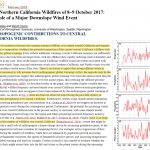
By Kenneth Richard on 17. September 2020
A “potential connection” between anthropogenic global warming and the frequency or intensity of wildfires in California has yet to emerge in the trend observations. Scientists have found a “lack of correlation between late summer/autumn wildfires” and “summer precipitation or temperature” in coastal California. In fact, “there is no long-term trend in the number of fires […]
Posted in Fire |
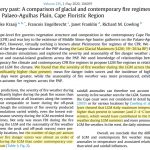
By Kenneth Richard on 3. August 2020
A new study finds that 26 to 19 thousand years ago, with CO2 concentrations as low as 180 ppm, fire activity was an order of magnitude more prevalent than today near the southern tip of Africa – mostly because summer temperatures were 3-4°C warmer. We usually assume the last glacial maximum – the peak of […]
Posted in Fire, Paleo-climatology |













Recent Comments